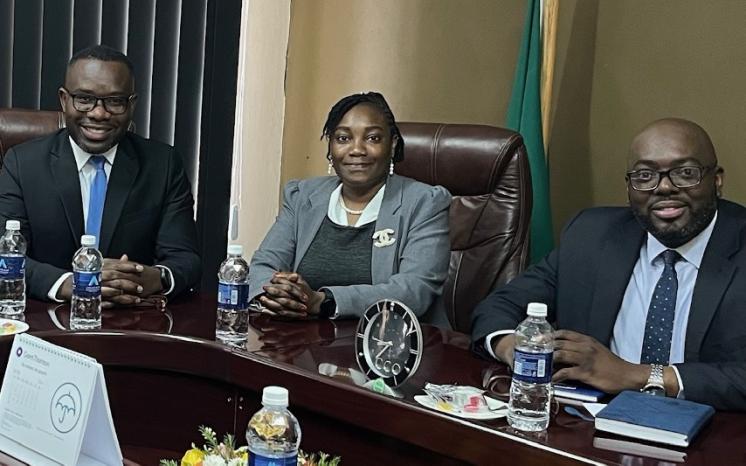
Talking reform: How Zambia can benefit from beneficial ownership transparency
Chewe Chilufya explains Zambia’s journey in reforming beneficial ownership transparency and its impact on mining sector governance.
Chewe Chilufya has taken many journeys. An early career move from producing gospel music and managing musicians to examining trademarks and patents at the Zambian Patents and Companies Registration Agency (PACRA) cemented his interest in intellectual property rights. During his rapid progression from Assistant Examiner of Trademarks to Deputy Registrar, this interest became a passion.
In conversation with Chewe at the PACRA offices in Lusaka, he charted the evolution of his career from office to office along its corridors, while reflecting on PACRA’s own journey from the use of paper-based solutions to digital systems.
“It’s a big dream,” he says, referring to PACRA’s vision for online, public access to information on the beneficial owners of companies. Beneficial owners, distinct from shareholders, are those who ultimately own or control companies and benefit from their proceeds. So far, reforms to establish an open register are bearing fruit. One of the first countries to sign up to the Opening Extractives programme in 2021, Zambia has been working to streamline its legislative framework for beneficial ownership and strengthen its online repository of beneficial ownership data.
Reforms to establish an open register are bearing fruit.
Initially, the concept of beneficial ownership was not widely understood. “When we started requesting beneficial ownership information,” explains Chewe, “many misunderstood a beneficial owner as simply a company’s shareholders.” Moving around Zambia’s main mining district, Solwezi, it is striking how deeply the concept of beneficial ownership transparency has now taken hold.
Those working on the digitisation and dissemination of information on the sector highlight multiple ways in which this data can be used to stem corruption. In addition, high demand for minerals needed for the energy transition is creating new understanding of the potential value of data on beneficial owners.
Moving around Zambia’s main mining district, Solwezi, it is striking how deeply the concept of beneficial ownership transparency has now taken hold.
Discussions in Zambia revealed additional, surprising linkages. For example, that registries could help to identify the beneficial owners of the company responsible for a devastating landslide at the Chingola mine in December 2023, which engulfed at least 25 workers.
Chewe has no doubt about the role of beneficial ownership as an anti-corruption tool. “If it is properly implemented, it will stamp out corruption. Companies do not think by and of themselves but through the natural persons who own and control them,” he says. He also maintains that responsible company owners have nothing to fear from transparency, and that reforms can play a role in ensuring that the Zambian government secures better value from mining operations.
If it is properly implemented, it will stamp out corruption.
Zambia has made progress towards the goal of establishing a public, economy-wide register of beneficial owners. This has required building collaborative networks and signing memoranda of understanding with other government agencies to ensure data sharing. The road hasn’t been without hurdles, but sustained support from Opening Extractives has helped position PACRA to address challenges, for example in verifying data of company owners and integrating ownership registers with other government digital platforms, including the mining cadastre. Integration forms part of broader national e-governance reforms. Vital legislative amendments have been approved in principle by cabinet and have technical support from the IMF, but further consultation processes on proposed legislative changes still need to be undertaken.

Currently, access to information on beneficial owners of Zambian companies is provided by PACRA for a small fee. While data is collected from companies, the level of compliance in making their declarations is still low, with around one-third of companies reporting beneficial ownership information. In line with the EITI Standard, however, data on the beneficial owners of extractive companies is provided in annual EITI reporting. While support from the Opening Extractives programme has contributed to reforms, efforts are being made at PACRA to institutionalise knowledge to sustain progress.
Testament to this, Chewe’s most recent career move has seen him return to the Intellectual Property Directorate at PACRA to assume its leadership. Work on the beneficial ownership register will be continued by PACRA’s CEO and Deputy Registrar of Companies, with Chewe advising on beneficial ownership transparency in this three-person reform team.
Alongside PACRA’s efforts, other government agencies are learning more about beneficial ownership data and its potential use. The next phase of the Opening Extractives programme, for example, focuses on how beneficial ownership data can be used to screen applicants for mineral licences. In the context of the energy transition and increased demand for transition minerals, fast-tracked licensing applications that circumvent normal procedures pose governance risks. Stakeholders in Zambia express concerns over the risk of sterilising reserves, due to licences being awarded to companies that lack the expertise to build viable operations. Other mineral-rich countries have used beneficial ownership data to identify malfeasance in the licensing process. An investigation in Ghana, for example, found that the beneficial owners of a mining licence held criminal convictions, contrary to Ghanaian law. The licence was subsequently revoked.
Information collected by PACRA on the beneficial owners of mining companies is expected to be critical in undertaking due diligence in this digitalised licensing process.
In Zambia, a new cadastral system aims to “take the fingers out” of mining licence applications. It will also enable mining licence applications to be logged from the first point of application, which is essential to track activity in the sector and the rate at which licence applications progress. Information collected by PACRA on the beneficial owners of mining companies is expected to be critical in undertaking due diligence in this digitalised licensing process.
As we wrap up in Chewe’s office, the former music producer turned advocate of beneficial ownership articulates his vision – a freely accessible beneficial ownership register within the next three years. The leadership team at PACRA find themselves in the centre of reforms that are significant for the country and its economy, which relies heavily on the extractive sector for crucial foreign currency earnings. The next milestone for the team comes in September, when a workshop with the IMF will focus on advancing legislative reform, and Zambia hosts a regional EITI event. The event – which includes 12 countries from the Anglophone and Lusophone Africa regions – will bring opportunities to demonstrate the value of this agenda and showcase progress made.





